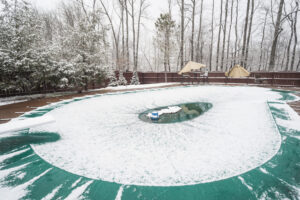How to Prevent Freezing and Damage to Your Pool During Winter
Winter is the hardest season for your pool, but with the proper precautions and maintenance, you can prevent freezing and damage, guaranteeing that when you get ready for your first springtime dip, your pool will be in the same working order you left it in when fall came around.
As the temperatures drop and winter approaches, it’s essential to prepare your pool to withstand the cold weather. Freezing water and winter storms can cause significant damage to your pool’s structure, plumbing, and equipment if not properly addressed. To prevent freezing and damage during winter, follow these comprehensive steps to winterize your pool effectively.
Winter weather in Chicago can bring brutal temperatures that might have a devastating impact on your pool or spa. Freezing water can clog your pumps, damage your pool’s surfacing and make your springtime a hazard of repair and reconditioning. You need to make sure that your number one outdoor investment is protected during the colder months.
If you want to keep your pool safe during winter, follow these steps.
Balance Water Chemistry
- Before beginning the winterization process, it’s crucial to ensure your pool water is properly balanced. Test the water and adjust the pH, alkalinity, and calcium hardness levels to the recommended ranges. Balancing the water chemistry helps prevent corrosion and scaling during winter.
 Clean the Pool Thoroughly
Clean the Pool Thoroughly
- A clean pool is less likely to develop problems during the winter. Use a pool brush and vacuum to remove debris, leaves, and algae from the water and pool surfaces. Pay special attention to the pool walls and corners to prevent algae growth.
Lower the Water Level
- To prevent freezing and damage to your pool’s plumbing and structure, lower the water level. In most cases, the water should be lowered below the skimmer and return openings. This prevents ice from expanding and potentially damaging these components.
Winterize the Plumbing
- Properly winterizing the pool plumbing is crucial to prevent freezing and costly repairs. Here’s how:
- Disconnect and Drain Equipment: Turn off the pool pump and filter system, disconnect all equipment, and drain it thoroughly. Store pumps, filters, and heaters in a dry, protected area to avoid freeze damage.
- Seal Plumbing Lines: Use pool winterizing plugs to seal the return jets and the skimmer. For in-ground pools, consider blowing out the plumbing lines with an air compressor to remove any remaining water. This step prevents water from freezing inside the pipes, which can lead to cracks and costly repairs.
Add Winterizing Chemicals
- To keep the water clean and free of algae during winter, add winterizing chemicals to your pool. Typically, this includes an algaecide and chlorine or bromine tablets. If you’re not sure what chemicals to add, call All Seasons Pools & Spas and we can point you in the right direction.
Install a Winter Pool Cover
- Invest in a high-quality winter pool cover designed to withstand cold weather conditions. Ensure the cover fits snugly over the pool and covers the entire surface. A well-fitted cover prevents debris, leaves, and snow from entering the pool.
Secure the Cover
- Properly securing the pool cover is essential to its effectiveness. Use water bags or weights to secure the cover’s edges. This prevents wind from lifting the cover and exposing the pool to the elements.
Protect the Skimmer
- For above-ground pools, install a skimmer plug to seal the skimmer. This prevents water from entering and freezing inside the skimmer, which can cause damage.
Monitor Water Level
- Throughout the winter, periodically check the pool’s water level. If it drops significantly, add more water to ensure the cover remains securely anchored and the pool is adequately protected.
Consider Pool Antifreeze
- In the Chicago area temperatures can sometimes be extreme. You may want to consider adding pool antifreeze. Pour it into the plumbing lines to provide extra protection against freezing.
Prevent Ice Buildup on the Cover
- During winter storms, be mindful of ice buildup on the pool cover. Excessive ice can weigh down the cover and potentially damage it. Use a pool brush or a roof rake to gently remove ice and snow buildup.
Regular Maintenance
- Especially during the winter, it’s essential to conduct regular maintenance checks. Inspect the pool cover and the pool area for signs of damage or If your pool cover is looking worse for wear, you may need to repair or replace it to make sure your pool is protected.
Protecting your pool from freezing and damage during winter requires thorough preparation and ongoing maintenance. By following these comprehensive steps to winterize your pool, you can enjoy peace of mind knowing that your pool will be in excellent condition when warmer weather returns. Proper winterization ensures your pool remains a source of enjoyment and relaxation for years to come, while also saving you from costly repairs. So, take the time to protect your pool this winter and enjoy the benefits of a well-maintained pool season after season. If you have any questions, the professionals at All Seasons Pools & Spas are ready to help. Stop by our Orland Park storefront location at 9135 W 135th St., or give us a call at 708-349-2222. Our experts are ready to help you weather the storm and make sure your pool remains in great condition no matter what mother nature throws at it.


